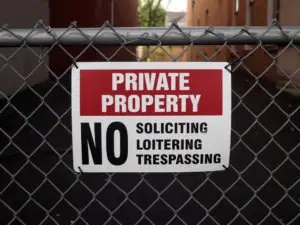
In the California Penal Code, there is no specific law that addresses simple loitering. Instead, loitering is a component of several different violations. While loitering on its own might seem like a minor infraction, as a component of another crime, it can be charged as a misdemeanor and carry heavy penalties.
An experienced criminal defense attorney will know all the ins and outs of the particular charge you face and will be able to advise you accordingly. When up against a potentially lengthy jail sentence, it is important to have legal representation, familiar with California loitering laws.
Different California Loitering Laws
While loitering may not have a specific charge of its own in California, it is still a key component in several other violations. The California Penal Code contains several sections in which loitering plays a role. A few of these violations include:
- California Penal Code Section 647(h): Loitering to Commit a Crime
- California Penal Code Section 653.22: Loitering With Intent to Commit Prostitution
- California Penal Code Section 653(b): Loitering at a School
In addition to these violations, there are also several crimes where loitering plays a smaller role but is still an element of the offense.
For a free legal consultation, call (310) 896-2723
Penalties for Loitering in California
The penalties for loitering in California vary based on which offense you are accused of violating. However, the majority of California loitering laws are processed as misdemeanors. Jail time for these offenses can generally vary between a maximum of six months and one year in prison.
The maximum fine for all the common loitering offenses is $1,000. Additionally, you may receive summary probation in lieu of jail time.
Defenses Against Loitering Charges
There are several defenses that can be made against a loitering charge. Many of these arguments are specific not only to the particular offense for which you have been charged but also the details of your case. However, some defenses are quite common and can be used to fight off any sort of loitering charge. A few of these common arguments are:
- That you were falsely accused
- That you were not loitering
- That there was no probable cause
False Accusation
No matter what the crime, there are often people who are falsely accused. The motives for false accusations can vary. Often, they occur because of anger and as a means for revenge. However, sometimes they can be made purely due to confusion on the part of the accuser.
Not Loitering
One of the most used defenses against a loitering charge is simply demonstrating that you were not loitering. If you were not standing or wandering around an area aimlessly, you were not, in fact, loitering.
In fact, of the three penal codes mentioned above, only PC 653(b): Loitering at a School is appropriately named. PC 647(h): Loitering to Commit a Crime and PC 653.22: Loitering With Intent to Commit Prostitution have misleading wording because since there is a purpose to the person standing or wandering around in an area, by definition, they are not actually loitering.
However, arguing that your purpose for hanging around was to commit an illegal act will not serve you well in court. If you had a legal purpose for hanging around an area, though, this defense can be a strong one.
No Probable Cause
Under the Fourth Amendment of the United States Constitution, authorities are required to have probable cause to arrest or detain a suspect. An experienced lawyer may be able to successfully argue that there was no probable cause for your arrest. If so, no evidence obtained as a result of the unlawful arrest will be admissible in court.
Controversy Surrounding Loitering to Commit Prostitution Law
California’s law against loitering to commit prostitution is highly controversial and may soon be overturned. LGBTQ advocates argue that the law allows law enforcement to target trans women and women of color based on how they dress. The argument is that the law detracts from the actual tracking of sex trafficking and instead focuses inaccurately on profiling.
A bill to overturn this law passed the state senate in September of 2021 and will go to the governor’s desk in January of 2022.
Complete a Free Case Evaluation form now
Hiring a Criminal Defense Attorney
If you are faced with a criminal charge for loitering under any of California’s various loitering laws, it is important to hire an experienced criminal defense attorney. At the Simmrin Law Group, our lawyers are dedicated to protecting our clients and giving them the best possible chance of beating a charge.
Give us a call or fill out our online contact form to schedule a free, no-obligation consultation. Our team will review your case and let you know about all your legal options.
Call or text (310) 896-2723 or complete a Free Case Evaluation form
